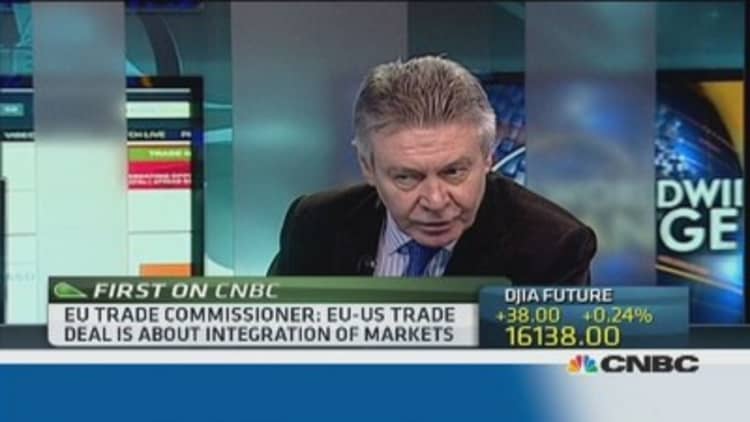"Tonight, I'm announcing that we will launch talks on a comprehensive trans-Atlantic trade and investment partnership with the European Union, because trade that is fair and free across the Atlantic supports millions of good-paying American jobs."
That was President Barack Obama describing a game-changing free-trade deal between the world's two largest economies in his 2013 State of the Union address.
Now, more than a year and three rounds of talks later, the challenges are piling up. This week, negotiators open a fourth round in Brussels—the first formal meeting since December—and there are several disagreements.
"It's a complicated agreement, because it's not just about market access, but regulatory access as well," said Karel De Gucht, the EU's top trade official leading the talks.
Yet Europe's trade commissioner says "we are certainly not behind schedule." Normally, he explained, a deal of this magnitude would take four to five years, "we'll cut that in two."
That would mean the deal would be finalized some time in 2015, an ambitious goal, but one that the EU insists is still on track.
(Read more: )
One of the main sticking points, according to De Gucht, is government procurement policies. Europe is insisting on better access to the American public procurement market, which would allow European firms to bid for public contracts in the U.S., both at the federal and state levels.
"There is no low hanging fruit anymore," De Gucht said.
There's also the issue of tariffs. After previous talks, reports cited European officials expressing their frustration and disappointment at the original U.S. offer, saying it did not go far enough toward reducing tariffs on European goods.
But the U.S. has doubts of its own over Europe's commitment to fully eliminate tariffs.
According to a senior administration official, "The U.S. remains committed to the goal, written into the High Level Working Group Report and endorsed by both our leaders, of eliminating all duties on bilateral trade," referring to an original working document that laid out the blueprint for the deal, including the elimination of all tariffs.
(Read more: Europe not 'giving in' with US deal: EU trade head )
"Recent actions by the EU seem to back away from this goal, and we need to know if it stands by its commitment or not," the official said.

Another potential roadblock: European officials are unhappy that the U.S. will not allow European negotiators to share the documents with national governments.
"We'll have to find a solution because we could lose confidence from our member states," De Gucht said. "Everyone is aware that it cannot continue like this and the U.S. will have to help us with respect to that."
(Read more: The most important indicator in the world now)
The talks can be contentious—raising deeply cultural and commercial issues spanning consumer protection, worker's rights, product safety, food safety and many more sensitive issues on both sides.
This week's negotiations are set to focus on procurement, as well as technical barriers to trade and the always hot-button agriculture sector.
One point both sides agree on: There will be a tremendous payoff, after the tough choices are made. The economies together account for 40 percent of global economic output and more than a third of global trade.
For American industry, a new study by the Bertelsmann Foundation, the Atlantic Council and the British Embassy in Washington concludes that 14 industrial sectors will see a boost in exports when the free-trade deal passes. Among the biggest beneficiaries, autos, metals and processed food, chemicals and machinery. The auto industry alone would see exports to the EU increase almost 650 percent from 2012 to 2027 thanks to fewer tariffs and rules, according to the report.
It's not just politicians who have a lot riding on these talks.
—By CNBC's Sara Eisen. Follow her on Twitter @SaraEisen.


